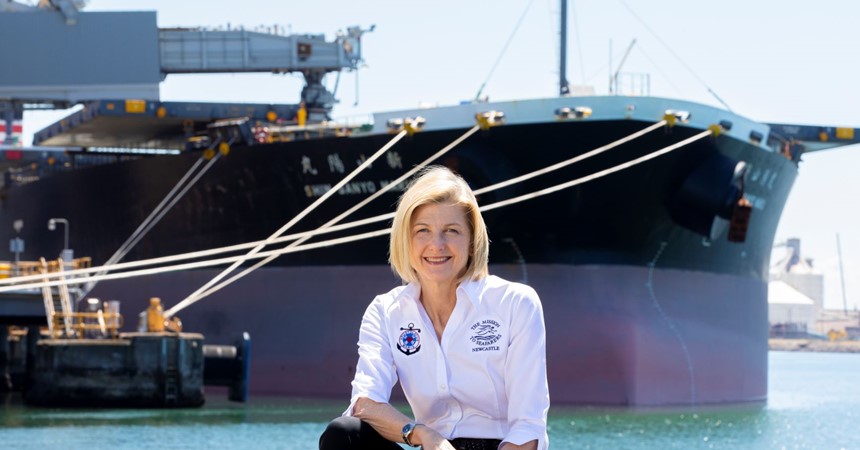Responsible for 95 per cent of all goods and products that come into Australia, seafarers are an “invisible workforce”. In “normal” times they endure tough and lonely conditions and confront genuine threats to their lives. Now COVID-19 has stranded them on board their vessels looking despairingly at one restricted-entry port after another.
Newcastle’s Mission to Seafarers Centre, with Stella Maris, contributes to a global network of chaplains offering 24/7 digital ministry. This ecumenical godsend has been keeping the world’s mercantile workforce sane and warm.
Bernadette Barry, Stella Maris Catholic chaplain at the Mission to Seafarers (MTS), says fortitude is the best description of seafarers’ experiences this year. “It’s their inner strength,” says Ms Barry.
“Not seeing their families, not getting off the ships, no communication with other people, and concerns over their pay. It’s just been a huge combination of issues that have affected them.”
MTS’s Christine Smith, Manager – Administration, says digital ministry has gained in importance. “We’re getting a lot of contact through social media from seafarers wanting to talk, and saying their families need help,” she says.
One seafarer reached out because his wife in The Philippines was suffering from cancer and not expected to live. The Newcastle mission passed his details on to the Australian Maritime Safety Authority (AMSA). He messaged the MTS offering his thanks when he was at the airport on his way home.
“Seafarers trust us,” says Ms Smith. “They know they can contact us confidentially.”
Under normal circumstances the MTS offers cooked meals, donated clothes, beanies, and access to money-changing and transfer facilities.
“We have had to look at other ways to assist them,” says Ms Barry. “We’re now doing about 30 care packs a week that go out to port. We pack in whatever we can.
“It’s all donated – magazines, DVDs, CDs, chocolates, beanies, rosary beads, Bibles, hand-written cards, games – we just try to put activity things in because they are telling us they are bored. The care packs have been a great success. We get messages of thanks back from those.”
Ms Barry presents a popular online reflection every week that gets a great reaction on MTS social media platforms. Matthew Couch, an Anglican chaplain at the MTS, also presents an online reflection, and readings. He tells the story of a New Zealand captain who is just moving between ports in the Pacific and can’t get off anywhere, including the one where he lives.
“He says it’s worse than being in prison, and he’s correct,” says Mr Couch. “Seafarers are stuck on the ship, they can’t get off, they can’t have visitors. Many have been on ships since before March.
“In terms of fortitude, there’s a limit. People are starting to break.”
Ms Barry picks up the point. “We are seeing that,” she says. “There have been some suicides in Newcastle. Seafarers who have had enough and cannot see an alternative. It has a dreadful effect on the crew. There are 23 to 25 per crew and they’re all so close. It affects every one of them, and we’re now unable to go to them and administer pastoral care as we normally would.”
The shutdown of port access to seafarers also disrupts the change of crews.
“If you consider there are 300,000 to 400,000 seafarers stranded at sea,” Ms Smith says, “there are many others waiting to come on. They’re sitting at home, not being paid, waiting for their chance. What are their families eating? That’s the other side. And sadly, those at sea can’t get their money home.”
Mr Couch says MTS wants to let seafarers know they are not forgotten.
“Even though there is no more face-to-face, they know when they come into port they are in a place where people care,” he says. Earlier this year, MTS placed a huge sign on the side of its van – “Seafarers Remember We Care For You”. Seafarers could see it from their ships, but so too could locals. The MTS has received an incredible amount of donated goods during coronavirus.
“There has been an outpouring of support,” says Ms Barry. “Parishes, community groups and individuals acknowledge just how difficult it has been for the seafarers. We’ve been overwhelmed. People just want to give something.
“We’re planning for our Christmas packs already. All donations for that would be gratefully received. Last year we did 800. There will be a greater need this year and we are pleading with local churches to dig deep. Your generosity will herald the end of a long year.”






















































































